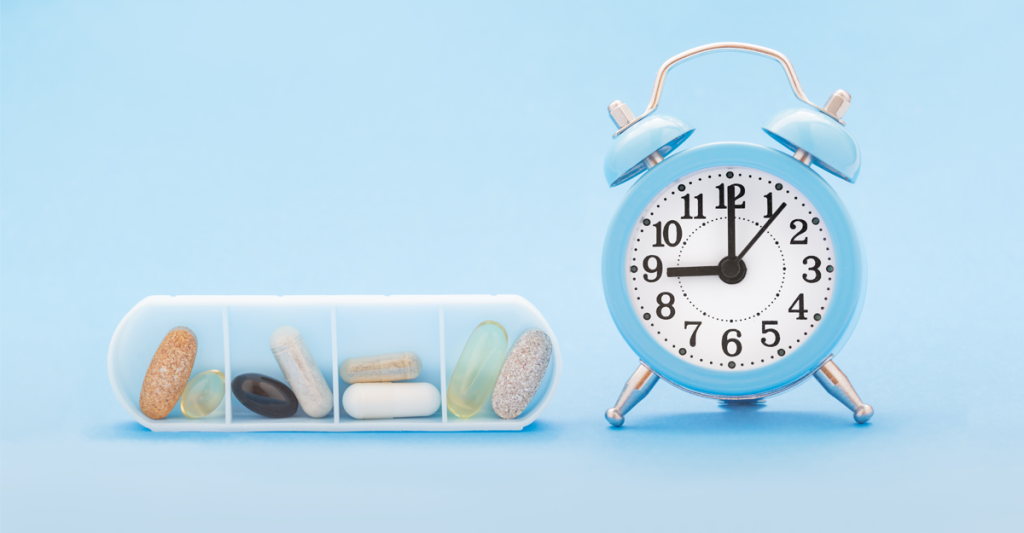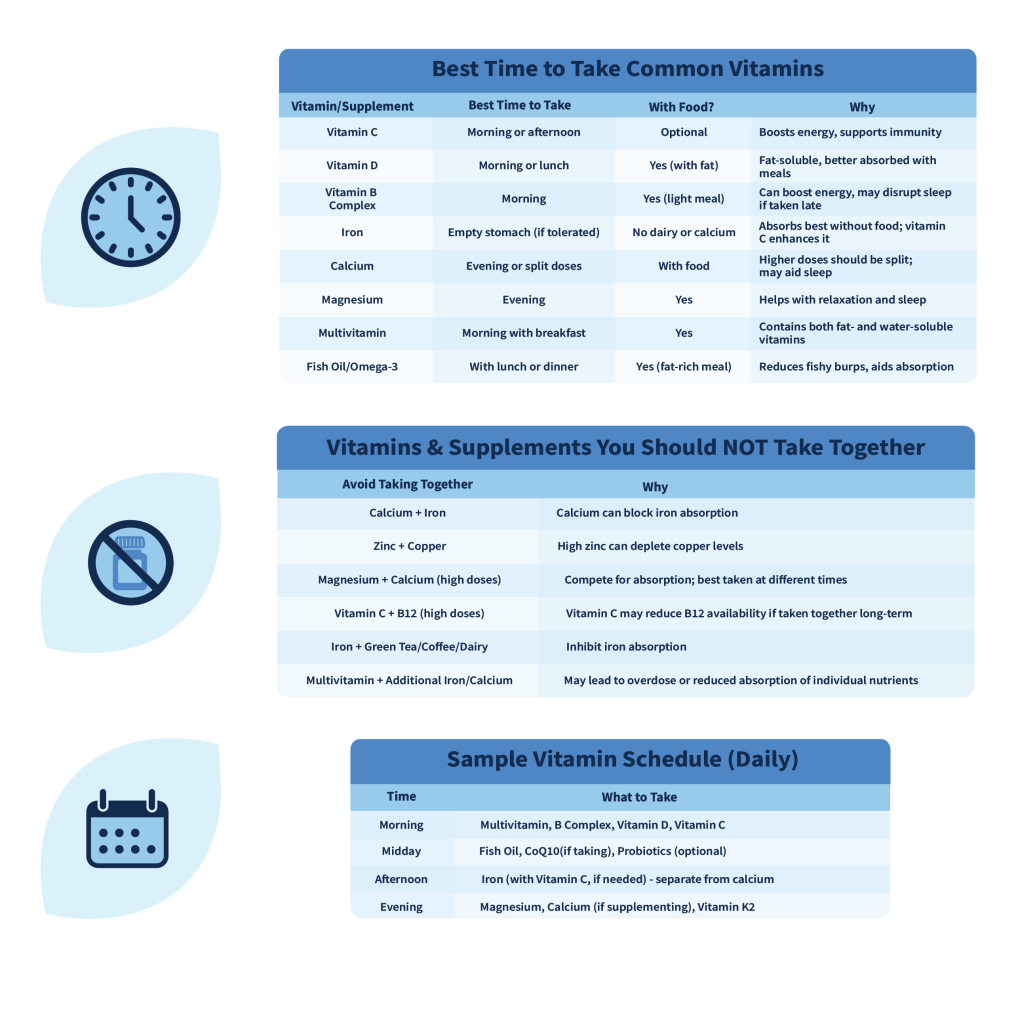
There is a lot of information out there on vitamins, and much of it is conflicting. Should you take them with food? Without? What time of day? Do I really even need them at all? If you eat a healthy and balanced diet, you probably only need multivitamins unless your doctor has identified a deficiency. But if you:
- Are vegan or vegetarian
- Have digestive issues
- Eat less than 1200 calories per day
- Have allergies, preferences, or intolerances that limit your food choices
- Have unhealthy habits that strip your body of vitamins, like chronic alcohol abuse
Then vitamins would probably benefit you, but it’s always best to talk to a healthcare practitioner before starting a new supplement. Multivitamins are generally a good choice if you don’t have any specific deficiencies, but not all multivitamins are the same.
- Men’s multivitamins typically contain more zinc and lycopene, but less iron, to support prostate health.
- Women’s multivitamins usually have extra folate, iron, and calcium to replenish minerals lost from menstruation or post-menopause.
- Kids and teen’s multivitamins have lower doses of vitamins and minerals that are dosed specifically for smaller bodies.
Vitamins are absorbed in different ways: some are fat-soluble while others are water-soluble, some may cause stomach upset if not taken with food, others work best on an empty stomach, and certain vitamins can even block each other’s absorption when taken together. So let’s break down some general rules about taking and combining vitamins.
The Best Time to Take Common Vitamins
Vitamins that work best when taken in the morning are typically fat-soluble, which means you can’t extract the nutrients from them unless you have something containing fat in your stomach. The vitamins that should be taken with food in the morning include:
- Multivitamins usually have both fat-soluble and water-soluble vitamins in them, so taking them with food in the morning will ensure the best absorption.
- Vitamin C, D, and B-complex vitamins should also be taken in the morning with food, not only for better absorption, but also for better support throughout the day. B and C vitamins are actually water-soluble, but still absorb just fine with food. The main thing is that all of these vitamins can boost energy, so taking them earlier will help you feel more awake during the day and keep them from disrupting your sleep.
- Vitamin E is fat-soluble and best taken with breakfast.
If you’re low in iron, the best time to take it is on an empty stomach. If you want even better absorption, you can pair it with vitamin C, which allows the body to absorb more iron.
When lunchtime rolls around, that’s the best time to take a fish oil supplement. Lots of people complain about “fish oil burps,” so to avoid that you should take it with food, not when your stomach is at its most acidic (in the morning). If you’re not much of a breakfast person, you can take your vitamin D or your multivitamin at lunch too, and the fish oil will provide the fat you need to absorb the fat-soluble vitamins.
If you’ve ever read the back of a sleep supplement, you may know that calcium and magnesium help your body relax and prepare for sleep. These vitamins pair super well together, helping your muscles relax and aiding your body in producing melatonin, one of the major hormones that help you fall asleep, so shoot for taking these in the evening.
Vitamins and Supplements You Should Not Take Together
As a general rule, minerals compete with each other to be absorbed, so you shouldn’t pair them together. Split up your doses of zinc, copper, and magnesium throughout the day for the best results.
Calcium is necessary, but problematic. Calcium often competes with other vitamins for absorption, especially if you are taking a high dose. If you’re someone who has low calcium, like post-menopausal women, you may need to split your calcium dose in half, taking it at separate times during the day.
Try to avoid taking your calcium with:
- Iron, because calcium decreases its absorption. Pay extra attention to this if you’re anemic, because taking your calcium at the same time as your iron can worsen your deficiency.
- Multivitamins usually have a little bit of everything, so taking them with additional iron or calcium may overload you on those minerals or reduce their absorption.
- Zinc blocks calcium absorption, and vice versa. So taking these two together essentially negates their effect.
Vitamin B12 is a go-to for people with low energy, so if you’re taking a long-term high-dose B12 supplement, make sure to take that at a different time than your vitamin C, or else you won’t be able to reap the benefits.
Lastly, avoid taking your iron with coffee or tea. That may be difficult since it is best taken in the morning on an empty stomach, but caffeine can actually bond to your iron supplement, making it more challenging for your body to break down.
You won’t need all of these vitamins, so pick and choose what you need, but here’s a good framework to start with:
Sample Daily Vitamin Schedule
Morning: Multivitamin, B complex, Vitamin C
Midday: Fish Oil, CoQ10, Probiotics, Vitamin D
Afternoon: Iron with Vitamin C
Evening: Magnesium, Calcium, Vitamin K
Our Top Tips to Make the Most of Your Supplements
Remember, supplements can help fill nutritional gaps, but getting your nutrients from whole-food sources is always best. However, not every diet is perfect. Be sure to chat with your healthcare provider before adding something new to your routine, particularly if you have any medical conditions.
With that said, here are some important tips to remember:
- Changes do not happen overnight. Take your supplements at the same time every day, and consider journaling how you feel. That way, you can look back and see what changes you’ve experienced since starting a new supplement.
- Read the labels! It’s not usually a good idea to take different vitamins with overlapping ingredients because they can affect each other, or you can end up taking more of a vitamin than is healthy.
- Pay attention to signs of obvious deficiency. Symptoms like fatigue, brittle hair or nails, frequent illness, numbness or tingling, or slow wound healing can signal that your body isn’t getting enough of certain vitamins.
Good luck on your vitamin journey! If you want a quick reference for vitamin timing and interactions, download or print our “when to take vitamins” chart to hang on your fridge.
Frequently Asked Questions
Best time to take supplements chart
You can download our vitamin schedule and chart here.
Should I take a multivitamin?
If you eat a healthy and balanced diet, you likely don’t need one. But if you have dietary restrictions, digestive problems, or illnesses that cause deficiency, it might be a good idea.
What vitamins should not be taken together chart
You can download our incompatible vitamin chart here.

* These statements have not been evaluated by the Food and Drug Administration. The products mentioned are not intended to diagnose, treat, cure, or prevent any disease.

